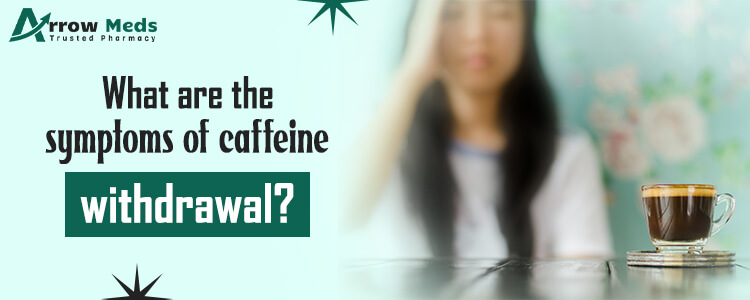Sorry, nothing in cart.
What are the symptoms of caffeine withdrawal?

Explanation of caffeine withdrawal
Caffeine is refreshment, which is contained in various things like sodas, teas, and coffee beans. This is best known to enhance energy, increase your alertness, and also improve attention. In addition, it also assists in decreasing tiredness, but taking an extra amount of caffeine causes health conditions like insomnia and headaches.
In chocolates and teas, caffeine not only enhances your internal vigor but also boost your overall immunity power, and consumption in high amount brings health problems like:
- High blood pressure
- Diabetes
- Sleep problems
- Irritability
Therefore, keeping yourself hydrated is important and also helps you to sleep properly every day.
Prevalence of caffeine consumption
An intake of caffeine in more amounts is the main reason for caffeine withdrawal, and this may lead to problems in people experiencing
- Dizziness,
- Restlessness,
- Gastric problems, etc.
According to a study, consumers of high intake of caffeine with 400 mg per day, including around 70% of men and 9% of women, take enough caffeine daily. Next, this ratio of intake of caffeine with taking around 300 mg per day, which is exactly at least 20% of men and 18% of women.
With the prevalence of caffeine consumption, men take high quantities of caffeine every day, although it brings caffeine withdrawal problems.
Common Symptoms of Caffeine Withdrawal
The increasing intake of caffeine causes caffeine withdrawal problems, and there are many symptoms of it, such as:
- Headache
- Mood swings or mood changes.
- Increasing fatigue
- Problem in concentration
- Focus trouble
- Constipation
- Insomnia or sleeplessness
- Anxiety
Timeline of Caffeine Withdrawal
Caffeine is a type of stimulant or a drink that completely cuts the sleepiness throughout the day and helps you to be alert at all times. At the same time, caffeine withdrawal symptoms occur when your brain balances to act without taking caffeine. Fortunately, its withdrawal provides lasting effects that will be easygoing and gentle always.
However, the exact timeline of caffeine withdrawal signs happens according to person. In contrast, such particular caffeine withdrawal typically gives an exact withdrawal that has long-term effects, which is around 9 days.
When people suddenly stop taking caffeine consumption even as they were intake it on a daily basis, they may experience caffeine withdrawal that lasts from 12 hours to 24 hours after it stops naturally.
However, its withdrawal impacts generally come out from 24 to 72 hours. The more your drink with caffeine content, the more problems you may face at that time.
Factors Influencing Caffeine Withdrawal
People who are in high doses of caffeine products can experience enough risk factors for caffeine withdrawal. All these factors influence caffeine withdrawal:
- Eating disorders
- Prisoners
- Alcohol or drug abusers
However, in the data, these people are patients of high caffeine withdrawal even though, this time, it is also vital to point to know the factors of caffeine withdrawal like the people who use more caffeine in a day so they experience many lifestyle changes.
It is still not clear in the data why some individuals don’t even experience such specific symptoms when they don’t take caffeine in high amounts so they may experience sensitivity to caffeine. Like this, it defines why some persons are sensitive to caffeine withdrawal; instead, they consume every day around 100 mg of caffeine.
Lifestyle and timing are the major factors that influence caffeine withdrawal symptoms. When a person takes caffeine drinks during the week, they may experience headaches and depression during the weekend time when they stop suddenly.
Furthermore, when an individual also stops intake of caffeine before going through a medical checkup, they may experience a fasting headache, which causes caffeine withdrawal problems.
Smokers Management and Coping Strategies
When people suffer from caffeine withdrawal, it should be dealt with, and management coping strategies. Let’s know how we should manage and avoid caffeine withdrawal symptoms with simple and effective tips that are followed here:
Decreases caffeine intake: Do not add more caffeine to your food list that causes caffeine withdrawal activity.
Use energy in different ways: You can enhance energy in different ways just by utilizing regular exercise performance and other hard-working activities.
Sound sleep is important: Getting enough sleep every day by taking sound sleep during the day and night also helps in reducing caffeine intake. Thus, do deep breathing techniques in a day to perform better.
Consume painkiller drugs: Take good quality the best painkiller medicines so that it helps to cut more caffeine in the day.
Conclusion
After the statement above about caffeine withdrawal, we conclude that taking caffeine-related products every day can affect our health emotionally and psychologically. However, it is an imperative thing to keep in mind that you should always take caffeine in very low amounts so that you can be protected from caffeine withdrawal symptoms easily.
Therefore, you have the best possible way to take low intake of caffeine-associated items in your life and don’t make it habitual or used to with it. Once you adjust to this process or technique, you can find there are no headaches and mood changes due to caffeine withdrawal.
Additionally, caffeine is another side beneficial for adults who want to be wide awake. Still, on the other side, it can cause many health issues like insomnia, headache, and fatigue, so it is better to cut the caffeine amount slowly in your life.
